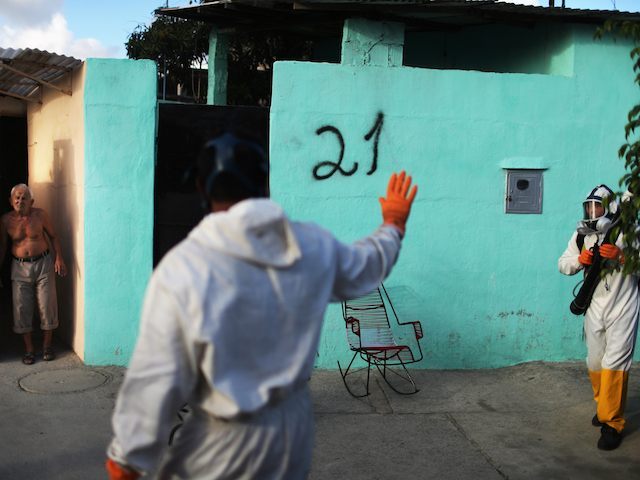The U.S. Southern Command (SOUTHCOM) is providing Department of Defense (DOD) personnel with guidance for personal protective measures in response to the mosquito-borne Zika virus outbreak in its area of operation (AOR).
SOUTHCOM is responsible for all U.S. military activities in Latin America and the Caribbean.
Health officials have tied the Zika virus to a neurological disorder that makes pregnant women and their babies particularly vulnerable. The Zika-linked malady, known as microcephaly, is a rare birth defect in which babies are born with smaller heads than normal and often have developmental problems.
“Pregnant DoD employees and beneficiaries in Zika affected areas will be offered voluntary relocation out of the affected areas,” Army Col. Lisa Garcia, a SOUTHCOM spokeswoman, told Breitbart News via email. “U.S. Southern Command has one person that is pregnant and she is scheduled to depart the area today on a permanent change of station. Her move was already schedule before Zika.”
“Guidance for personal protective measures (insect repellent; treating clothes with Permethrin; minimizing exposed skin; removing areas of standing water; remaining indoors in air conditioned or screened buildings, if possible) was already in place for our DoD personnel as a result of [the diseases] dengue and Chikungunya,” she also said, later adding, “Currently, there are no changes to our exercises, training or deployments. We continue to stress personal protective measures for our personnel.”
Aedes aegypti, the mosquito responsible for carrying Zika, also spreads dengue and Chikungunya.
The U.S. Centers for Disease Control and Prevention (CDC) has identified 24 countries in territory as Zika-affected areas and has warned against traveling to those countries.
Except for two, Samoa (Oceania/Pacific) and Cape Verde (Africa), the countries are all located in SOUTHCOM’s AOR.
“The SOUTHCOM staff is leaning forward to identify actions we can execute to support our Partner Nations, if asked,” declared Col. Garcia. “We have not been asked for support but want to be prepared.”
On Wednesday, the Pentagon announced that it had been asked to provide support to the U.S. Department of Health and Human Services (HHS) in its fight to protect Americans and prevent the disease from spreading in the United States. ‘
Pentagon press secretary Peter Cook indicated that DOD had been asked by the White House to assist HHS “in their efforts to convene experts and stakeholders, specifically in the research area.”
“This is an area where the DOD has done some research in the past, and I think some of that expertise will be brought to this effort, and we’ll be supporting HHS in whatever way we can,” added Cook.
President Obama along with public health and national security officials, including Deputy Defense Secretary Bob Work, met in the White House Situation Room on Tuesday to discuss efforts to protect Americans and prevent the spread of the disease in the United States.
CDC reports that “no locally transmitted Zika cases have been reported in the continental United States, but cases have been reported in returning travelers.”
“With the recent outbreaks in the Americas, the number of Zika virus disease cases among travelers visiting or returning to the United States likely will increase,” warns CDC. “These imported cases may result in local spread of the virus in some areas of the continental United States, meaning these imported cases may result in human-to-mosquito-to-human spread of the virus.”
The first confirmed Zika virus infection was identified in Brazil back in May 2015.
Both legal and illegal travelers to the U.S. from countries where mosquitos carry the virus could potentially bring the disease into this country.
CDC has issued a travel alert for people traveling to Zika-affected areas: Barbados, Bolivia, Brazil, Colombia, Cape Verde, Dominican Republic, Ecuador, El Salvador, French Guiana, Guyana, Guadeloupe, Guatemala, Haiti, Honduras, Martinique, Mexico, Panama, Paraguay, Puerto Rico, Saint Martin, Samoa, Suriname, U.S. Virgin Islands, and Venezuela.
There is no vaccine or preventing drug to combat the virus, according to CDC.
“Zika virus is spread to people through mosquito bites. The most common symptoms of Zika virus disease are fever, rash, joint pain, and conjunctivitis (red eyes),” explains CDC. “The illness is usually mild with symptoms lasting from several days to a week. Severe disease requiring hospitalization is uncommon.”
Dr. Margaret Chan, director of the World Health Organization (WHO) warned that the virus “is now spreading explosively” across the Americas, noting that “the level of alarm is extremely high.”

COMMENTS
Please let us know if you're having issues with commenting.